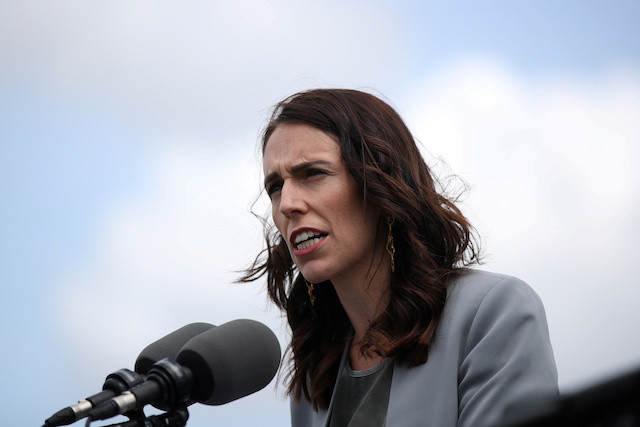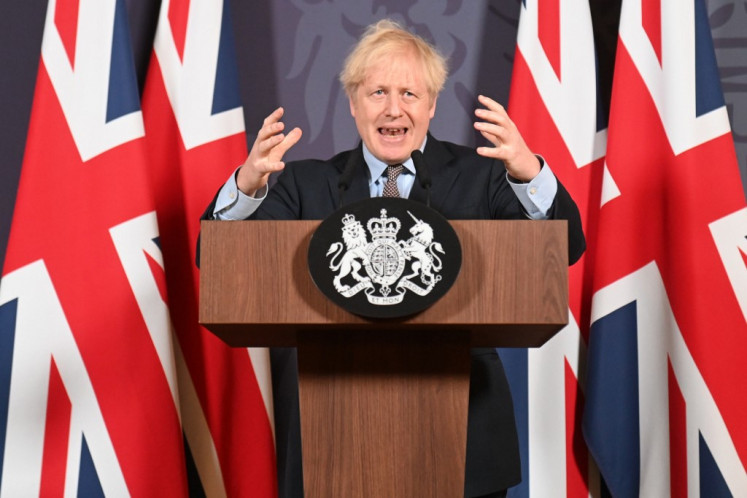Popular Reads
Top Results
Can't find what you're looking for?
View all search resultsPopular Reads
Top Results
Can't find what you're looking for?
View all search resultsArdern says border workers must take COVID-19 vaccine after new cases
New Zealand has virtually eliminated the COVID-19 virus within its borders and there's been no community transmission for more 40 days.
Change text size
Gift Premium Articles
to Anyone
N
ew Zealand's Prime Minister Jacinda Ardern said on Monday that people working at the borders must be vaccinated by the end of this month or risk being moved out of the role, after a third coronavirus case related to a frontline staff was reported.
New Zealand has virtually eliminated the COVID-19 virus within its borders and there's been no community transmission for more 40 days.
But it reported a positive COVID-19 in the community last week of a border worker who had missed two vaccine appointments. Two more cases linked to this individual has emerged since.
"By the end of April, those not yet vaccinated will not be permitted to work in high-risk workplaces and will be moved to other roles," Ardern said at a news conference, as reported by Reuters.
She said about 86 percent of border workers have been vaccinated.
New Zealand has started vaccinating its border and managed isolation facility workers and their family with BioNTech-Pfizer vaccines in its first phase. So far it has vaccinated over 90,000 people. The country last week temporarily suspended entry for all travellers from India, including its own citizens, following a high number of positive coronavirus cases arriving from the South Asian country.
Meanwhile, Britain was to partially lift coronavirus restrictions Monday, reopening shops, gyms, pub gardens and hairdressers, while India moved to ban exports of a virus treatment drug as a record surge of cases overwhelms its healthcare system.
The contrast in their fortunes comes as other nations grapple with mounting cases and vaccine rollouts hampered by health, efficacy and as the global death toll tops 2.9 million.
Prime Minister Boris Johnson hailed the easing as a "major step" towards normal life resuming in the country once the worst affected in Europe, following a successful vaccination campaign and lockdown measures that have cut deaths by 95 percent and cases by 90 percent from January highs, AFP reported.
Britain's Prime Minister Boris Johnson gestures as he holds a remote press conference to update the nation on the post-Brexit trade agreement, inside 10 Downing Street in central London on December 24, 2020. Britain said on Thursday, December 24, 2020 an agreement had been secured on the country's future relationship with the European Union, after last-gasp talks just days before a cliff-edge deadline. (Agence France Presse/Paul Grover)But India, the world's second-most populous country, has experienced a sharp rise in cases after several weeks of religious festivals, campaign rallies and lax mask-wearing.
It added 152,000 new cases on Sunday to take its toll to 13.3 million infections.
The government is desperate to avoid a hugely unpopular second lockdown but many states are tightening the screw. In worst-hit Maharashtra and its capital Mumbai, restaurants are shut and public gatherings of more than five people are banned.
The health ministry said the surge has led to a "spike in demand" for the antiviral drug Remdesivir, forcing the ban on its export despite a World Health Organization-backed study saying it has "little or no effect" on Covid-19 mortality.
Concerns over the side effects and effectiveness of tested and approved vaccines continue to rattle nerves elsewhere.
Australia abandoned its goal to inoculate almost its entire population by the end of the year after new medical advice that people under 50 should take Pfizer's vaccine instead of AstraZeneca over a potential link to blood clots.
Fears over the effectiveness of the vaccine manufactured by China's Sinovac were brushed aside by Beijing on Sunday after a top disease control official suggested the country's vaccines "don't have very high rates of protection".











